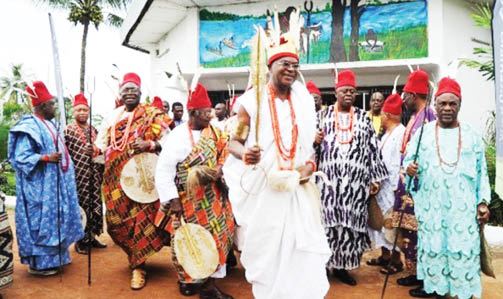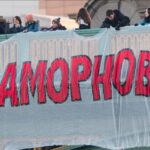Although the regalia of the Obi of Onitsha, the revered paramount ruler of the commercial city in Anambra State, is flamboyant in all respect, it has no spiritual connotation.
The rich traditions of the Igbos are not in doubt. The colourful-flourishing attires of the people are next to none. The enthralling masquerades and scintillating dances especially of the maidens are always enchanting. The age-grade group philosophy of the Igbos is also a worthy phenomenon bringing a structured societal system.
Onitsha kingdom is one of the towns in Igboland that still retained its cultural identity and values. It is said they are descendents of Benin Empire in the present Edo State.
According to historical accounts, the immigrant settlers from Benin were helped by the Igalas who were fishermen to cross the river Niger to settle in Onitsha in the 16th Century.

Onitsha is made up of three groups of people especially the Edos, that is the Eze Chima’s, the Igalas, fishing at the Niger and the thirdly, the Igbos, who are very close to the river Niger and had integrated with them. These three groups make up what is today known as Onitsha kingdom. Onitsha tradition is blended with the three peoples.
It was gathered that in the past, there were some villages in Onitsha that spoke Igala. The riverine community is made up of nine villages. Two out of these are purely the Igalas, Ogbodu and Obigboru.
According to Dr. Alex Anedo of the department of Igbo Language and Nigeria Culture, Nnamdi Azikiwe University, Awka, Anambra State, the Onitsha people with Edo influence are of the monarchy itself. In fact, Onitsha tradition is a combination of various backgrounds that have been blended to form the present day traditional institution. As a result, the traditional attire of the Obi of Onitsha is fashioned in a way of Benin kingdom and others.
Dr. Anedo pointed out that regalia of Obi of Onitsha do not have noticeable spiritual connotations, since most of them are for identity purposes. According to him, what the Obi wears as traditional regalia is more or less “borrowed” from other cultures.
He said the large hat with various feathers worn by the Obi symbolises royalty and affluence because an “ordinary” person could not have afford to kill such a number of birds. Again, the feathers are from highly rare birds and can only be acquired by people of great wealth.
The white gown worn by the Obi is symbol of purity and integrity. It is a similar dress worn by the Oba of Benin. In Igbo land, white symbolises purity and hospitality. It is being worn by the Obi to show the purity of the throne and the occupant of the position.
According to Dr. Anedo, who hails from Nnando in Oyi Local Government Area of Anambra State, the Igboman uses white clay chalk to welcome visitors, which shows love and purity of heart. He said in Igbo culture white is also used to make sacrifices to deities to show wholesomeness of heart and generosity.
The bracelets, beads among other ornaments worn by the Obi, Dr. Anedo explained, are precious items which depict greatness. It also shows royalty, authority as well as dignity. The university don said: “And to the best of my knowledge it has no spiritual or fetish connotations.”
Anedo said some of the beads either on the leg, hand and around the neck of the Obi is mostly for identification purposes only to differentiate from the subjects. He also said that now, most of those items could be worn by any person who has the resources to buy them.
The lecturer noted that “all these regalia are just for identification. They have no spiritual significance. We learnt they are borrowed from the Benin, Yoruba, Hausa and Igala people. The tradition of one man being a king is not an Igbo culture. It is borrowed but at any time in Igboland, there is a king for a particular purpose but no king of Igboman for everything.”
He disclosed that in Igboland, there used to be Eze Ji (king of yam), Eze Nnaya (king of hunters) and these are people who showed great exploit in their careers. According to him, throughout Igboland, it is the Onitsha people who have been consistent in the leadership style and it is because of its origin.

 Join Daily Trust WhatsApp Community For Quick Access To News and Happenings Around You.
Join Daily Trust WhatsApp Community For Quick Access To News and Happenings Around You.


